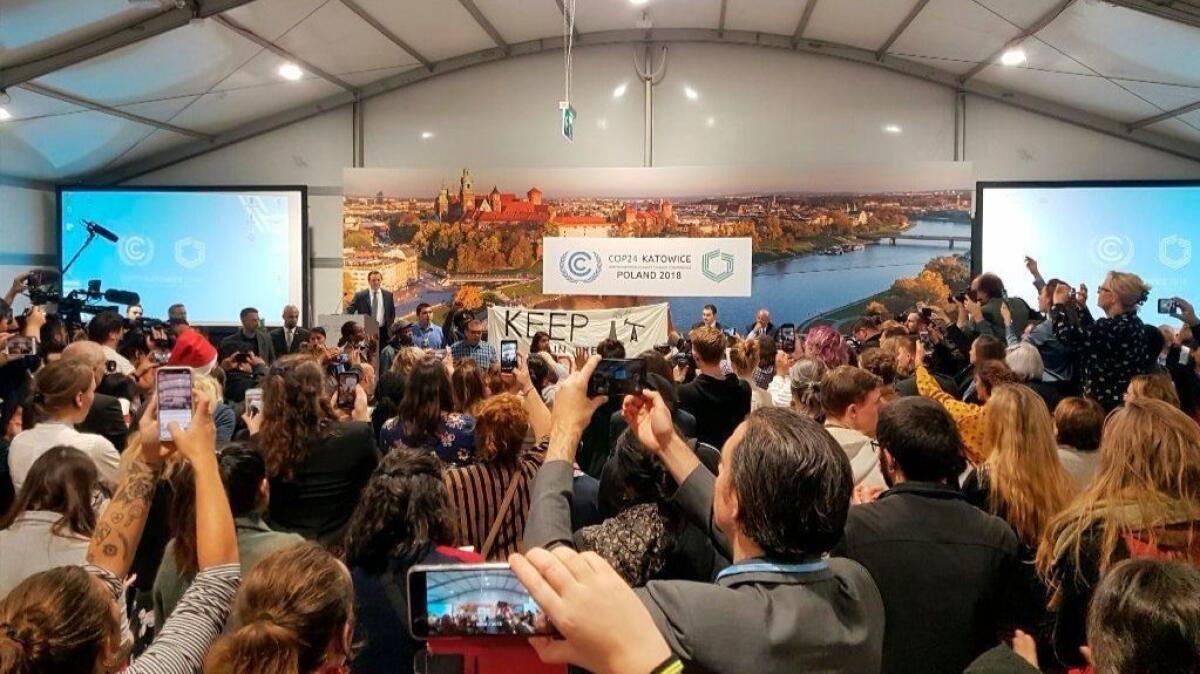The U.N. climate talks are focused on reducing fossil fuels. The U.S. showed up and promoted coal

- Share via
Reporting from Katowice, Poland — Protesters on Monday disrupted the Trump administration’s only official event at the U.N. climate conference — a panel defending fossil fuels — with laughter and chants of “Keep it in the ground.”
Scores of demonstrators from youth and indigenous groups let President Trump’s energy advisor Wells Griffith get 10 minutes into his policy talk before erupting into loud, prolonged guffaws followed by chanting.
“Trump’s presence here is a joke. His only priority is ensuring fossil fuel CEOs squeeze every last dollar out of our communities,” said Aneesa Khan, 23, with SustainUS, a U.S.-based, youth-led advocacy group.
The panel embracing coal, natural gas and nuclear power highlighted the United States’ near-outlier status as nearly 200 other nations worked to address scientists’ warnings.
Two days earlier, the U.S. sided with Russia, Saudi Arabia and Kuwait to block endorsement of a landmark climate report that warned of the dangers of allowing warming beyond 1.5 degrees Celsius (2.7 degrees Fahrenheit) over preindustrial levels.
Other nations wanted the conference to “welcome” the Intergovernmental Panel on Climate Change report warning the dangers of global warming are coming faster than predicted. The four oil- and gas-exporting nations wanted the conference to merely “note” the existence of the report, which strongly suggested drastically cutting fossil-fuel emissions by 2030 to mitigate the worst effects of climate change.
Experts expect the battle over whether to embrace the report to reignite as higher-level delegates arrive this week.
“The administration is out of step with the transformation happening across the country and the world,” said Lou Leonard, the World Wildlife Fund’s senior vice president for climate change and energy.
The United States is looking to continue investing in fossil fuels instead of weaning away from them, he said. “U.S. influence in these talks is waning as global leaders recognize the difference between these two visions for the future.”
Once a key player in the climate change negotiations, the United States has said it will back out of the Paris climate accord signed by then-President Obama in 2015. More than 190 countries have signed the agreement, pledging to lower greenhouse gases to keep global temperature rise well below 2 degrees Celsius.
But President Trump has mocked the agreement and has questioned the overwhelming scientific consensus about human-caused climate change. He said he didn’t “believe” the congressionally mandated National Climate Assessment, a comprehensive and dire study on the effects of climate change that his own government released last month.
The U.S. political delegation had come to the conference to promote what the Trump administration calls its “balanced approach” to energy security and accessibility, environmental protection and economic development, Griffith said. The U.S. planned to continue to supply energy to the rest of the world with coal, natural gas and nuclear power, he said. He cautioned several times against “alarmism” over climate change.
“All too often at meetings like these, alarmism displaces pragmatic solutions to address energy and environmental concerns,” he said. During his talk, Griffith waited for the protesters to finish and leave, then he continued, with seemingly lowered enthusiasm.
Because the U.S. cannot officially pull out of the Paris agreement until November 2020, it sent at least 40 delegates to Poland to work on the technical aspects of the agreement. Most of the delegates work for the State Department, and several were on the 2015 team that helped write the Paris accord.
“There’s no escaping the fact that the loss of U.S. federal leadership on climate action has a chilling effect internationally,” said Reed Schuler, who was a U.S. delegate to climate change talks from 2013 to 2015.
“That’s why other U.S. leaders are here to discuss how they are doubling down on climate action to make up for the federal government,” said Schuler, now a senior policy advisor on climate and sustainability in the office of Washington Gov. Jay Inslee.
Shortly after Trump announced that the U.S. would pull out of the accord, a group of states, cities and businesses joined together to create the We Are Still In movement. They committed to lowering emissions on the state and municipal level and to following other initiatives in line with the Paris accord.
The group, which has grown to more than 3,500 members, has no negotiating power in the talks but is holding meetings with world leaders.
“They aren’t the federal government, but in lieu of that, they are giving hope to other countries, particularly the small, poor countries who are looking for U.S. leadership,” said David Waskow, director of the International Climate Initiative at the World Resources Institute think tank in Washington.
Ayres is a special correspondent.
Twitter: @sabraayres
Ayres is a special correspondent.
More to Read
Sign up for Essential California
The most important California stories and recommendations in your inbox every morning.
You may occasionally receive promotional content from the Los Angeles Times.











